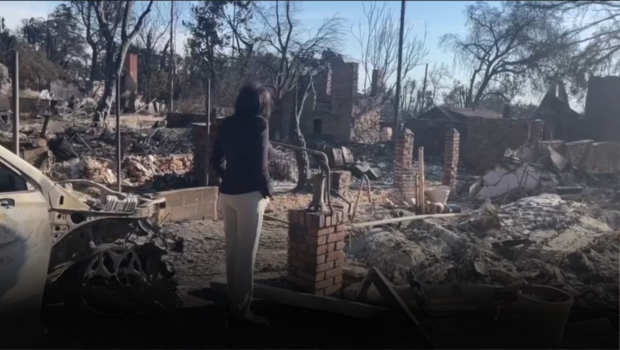Altadena, a city that has long been a refuge for Black families, was devastated when the Eaton Fire burned through it earlier this month, taking more than just homes and memories.
“I adore the neighborhood,” said Trevor Howard Kelley, a local. “I have Altadena tattooed on me believe it or not.”
In addition to destroying his family’s home, the Eaton Fire also killed his 83-year-old mother, a community leader.
“One house my whole life,” stated Trevor. “Now, it’s gone and my beautiful mother is gone.”
Kelley has spent his whole life in Altadena. With the aid of the GI Bill, a federal program that gave veterans advantages like home loans, his father, who had served in the US Navy, purchased the family home in 1968.
“We tried to get property in Pasadena but of course, they redlined everyone to Altadena, so that’s how we landed there,” Trevor explained.
The Federal Reserve claims that the Federal Housing Administration was established by the US government in 1934 to guarantee “economically sound” loans in the wake of the Great Depression.Redlining, which highlighted high-risk districts in red, was one tactic employed by both public and commercial mortgage lenders to guarantee loans with good economic foundations. Usually, these redlined zones were Black or urban communities.
Prior to the 1968 Fair Housing Act, which prohibited redlining and other practices that denied loans based on a person’s race, color, national origin, and other ethnic characteristics, mortgage lenders would refuse people credit based on their communities.
Since Altadena was one of the few neighborhoods where minorities could obtain a housing loan, the Kelleys were one of many black families who relocated there.
“It was basically, very racially acceptable for the African American,” he stated. “They could come here and get their businesses without having to through a lot of red tape that they were experiencing in other states.”
According to town councilwoman Darlene Green, the enclave became a haven for the Black community, housing Academy Award-winning actor Sidney Poitier, author Octavia Butler, and baseball great Jackie Robinson.
Kimberly, Trevor’s wife, remarked, “My grandmother, who taught the home as a single woman, was with 10 children,” “She made a scrape. She was employed.
According to Kimberly, Altadena gave her family a taste of the American Dream as well.
“All of her grandchildren, it was probably like 30 of us, all were raised and have memories,” she continued. “We’re close, became close, remained close, because of that home.”
Historically, more than 40% of Altadena’s homeowners were African Americans. In 2025, 81% of the town’s 18% Black population will own a home, which is nearly twice the national average.
“We have a lot of blue-collar and white-collar workers,” Greene stated. However, what makes this place unique is that everyone is treated equally. The community is capitalized with a C.
These houses were meant to be inherited by family members, paving the way for future generations to enjoy prosperity.
When Trevor remarked, “He bought that home,” My sister and I would inherit it from our parents after they passed away, and she is childless. I’d let my children handle it. We intended to continue it.
Many people in the neighborhood have multiple relatives who live close to one another.
“They are here with their children and their children’s children here,” Greene stated.
The second-most devastating fire in California history is the Eaton Fire. More than 10,000 buildings were destroyed or severely damaged, including eight of the Williams family’s residences.
“People want us to be really, really sad, and we are inside, but I mean we’re ok,” said Ellen Williams. “We’re ok.”
Black residents make up around 20% of those impacted by the Eaton Fire. Many locals worry that they may be priced out of their lifetime community as a result of neighborhoods being destroyed.
“My biggest fear is not gentrification, but colonization,” Kimberly stated. “This means that when you come to colonize, you will replace the people who worked so hard, were resilient, and were redlined up here. You will gentrify the neighborhood and make it lovely. Your capitalistic selves will take their place.
Greene said discussions about the increasing concern have already begun at the Town Council.
“I’d like to make sure that the people representing us advocate for the people that have been here grandmothers and generations that have been here and built their homes,” Greene stated. “[I’d like to make sure] they don’t let land developers come in here and price us out.” `
